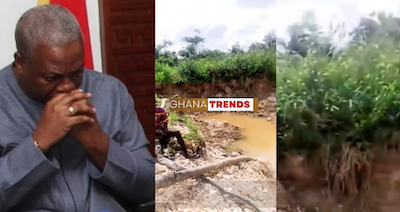In a viral video that’s ignited fury across Ghana, a defiant illegal gold miner, locally termed a “galamseyer,” has stunned the nation with his unapologetic defense of destructive practices.
Filmed amid the wreckage of a recent military crackdown, the miner mocks government efforts to curb galamsey, small-scale illegal mining that ravages rivers and farmlands, claiming operations resume swiftly despite enforcement.
“Soldiers came to burn our machines, but we’ve already bought a new one for 90,000 cedis,” he boasts in the footage, translated from Twi, underscoring the lucrative cycle fueling environmental havoc in regions like Ashanti and Western.
SHOCKER: Galamseyer’s Brazen Plea to President Mahama Sparks Outrage – Illegal Mining in Ghana [VIDEO]
The miner’s most inflammatory remark targets President John Dramani Mahama directly, urging him to “give us machines to destroy the land” rather than halt the activity. He dismisses concerns for future generations as elite hypocrisy, pointing to visible devastation: scarred earth, polluted streams, and even encroaching on nearby homes. “You can’t stop it—we’re destroying the land, and we’ll buy new equipment 10 times if you destroy it 10 times,” he declares, highlighting the resilience of galamsey networks that evade crackdowns through rapid reinvestment and alleged local complicity.
Deepening the controversy, the galamseyer alleges police involvement, referencing a figure named “Ato the fighter” who reportedly subdued officers during a raid. He questions the origins of chiefs’ opulent gold jewelry, implying galamsey as the unspoken source of community wealth. “How do you think the chiefs got those gold wristbands if not for galamsey?” he retorts, framing illegal mining as an economic lifeline for impoverished communities, even as it threatens public health through mercury contamination and water scarcity.
Critics, including environmental activists and opposition voices, decry the video as a stark emblem of galamsey’s entrenched grip on Ghana’s socio-economy. With operations generating billions in informal revenue yet costing the nation dearly in lost biodiversity and farmland—estimated at over 2 million hectares degraded—calls intensify for holistic reforms. The miner’s flippant valuation of ruined old houses at “10 pounds” or even a billion cedis with “change” only amplifies perceptions of moral detachment, as affected residents mourn irreplaceable heritage.
As the clip spreads on social media, it fuels a broader anti-galamsey movement, with netizens demanding stricter penalties and sustainable mining alternatives. President Mahama’s administration, already under pressure from ongoing “Operation Halt” raids, faces renewed scrutiny. While galamsey employs thousands in rural areas, experts warn that unchecked defiance like this could accelerate Ghana’s slide toward irreversible ecological collapse, urging immediate policy shifts to balance livelihoods with land preservation.



